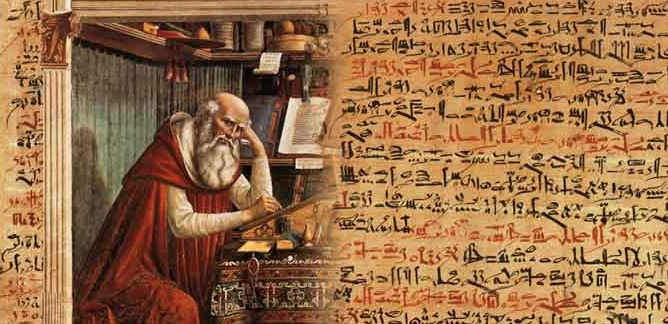The Edge - Thought Leadership on the Epic (EHR)
From Papyrus to Pixels: The Evolution of Healthcare Record Keeping
Ever heard of the Edwin Smith Papyrus? It's one of the oldest known medical texts in history---an ancient Egyptian medical treatise that dates back to around 2000-1700 BCE, making it over 3,500 years old! The papyrus is named after Edwin Smith, an American Egyptologist who purchased it in Luxor, Egypt, in 1862. This papyrus is a surgical treatise that focuses on various injuries and traumas affecting different parts of the body; it provides a compilation of medical cases, descriptions of wounds, and possible treatments. While the author of the Edwin Smith Papyrus remains unknown, it is believed to be based on earlier sources and knowledge passed down through generations of Egyptian healers and physicians.
Healthcare record keeping has come a long way over the centuries. From papyrus scrolls to modern-day electronic health records (EHRs), the evolution of healthcare record keeping has transformed the way patient information is stored, managed, and utilized. In this blog post, we take a captivating journey through time to explore the fascinating history and milestones that have shaped healthcare record keeping into what it is today.
Ancient Beginnings: Papyrus Scrolls and Clay Tablets
Thousands of years ago, in ancient civilizations such as Egypt and Mesopotamia, medical knowledge was recorded on papyrus scrolls and clay tablets. These early records included information on treatments, medicinal herbs, and patient observations, laying the foundation for future record keeping practices.
The Renaissance and the Birth of Medical Charts
Fast forward to the Renaissance era, where medical charts began to emerge. Pioneering physicians like Leonardo da Vinci and Andreas Vesalius utilized anatomical drawings to document their findings and further the understanding of human anatomy. These early charts were essential precursors to the more organized medical records that would follow.
The Emergence of Hospital Records in the 19th Century
The 19th century marked a turning point in healthcare record keeping with the establishment of hospitals. As medical practices advanced, physicians started keeping more systematic patient records. These records included patient demographics, medical histories, and treatment plans, enhancing the continuity of care.
Paper-Based Medical Records in the 20th Century
The 20th century witnessed a significant shift from handwritten hospital records to standardized paper-based medical records. The introduction of medical coding systems and the use of filing cabinets improved the organization and accessibility of patient information.
The Digital Revolution: Electronic Health Records (EHRs)
The dawn of the digital age brought forth a revolutionary change in healthcare record keeping. In the 1960s, early computerized systems began to replace manual methods. However, it wasn't until the late 20th century that true electronic health records (EHRs) gained momentum.
The Rise of EHRs in the 21st Century
The 21st century saw widespread adoption of EHRs, transforming the landscape of healthcare record keeping. EHRs allow for real-time access to patient information, increased data accuracy, and seamless data exchange between healthcare providers. Moreover, they pave the way for advanced technologies like data analytics and artificial intelligence to enhance patient care.
The Future of Healthcare Record Keeping: Beyond EHRs
As technology continues to advance, the future of healthcare record keeping holds exciting possibilities. Concepts like blockchain-based health records, wearable health devices, and telemedicine are reshaping the way patient data is collected, stored, and utilized. Additionally, the growing emphasis on patient privacy and data security remains a crucial factor in shaping future record-keeping practices.
Conclusion
The evolution of healthcare record keeping is a testament to human ingenuity and our dedication to improving patient care. From ancient scrolls to modern EHRs, each milestone has brought us closer to a more interconnected and efficient healthcare system. As we look ahead, embracing emerging technologies and prioritizing data privacy will further drive the evolution of healthcare record keeping, shaping a brighter and healthier future for us all.

